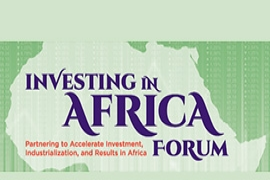30 June-1 July 2015. Addis Ababa, Ethiopia. The Investing in Africa Forum: Partnering to Accelerate Investment, Industrialization, and Results, was co-organized by the Government of Ethiopia, the China Development Bank, the China-Africa Development Fund, the World Bank Group, and the United Nations Industrial Development Organization.
It brought together representatives of the public and private sector from China and African countries. Regional institutions, development partners and think tanks also attended. Participants exchanged views on how African countries could attract greater investment, accelerate industrialization, create jobs and sustain development. The Chinese and African experiences were shared in order to provide information and lessons learned, and identify opportunities for enhanced partnerships, according to the World Bank.The Forum was an opportunity for pragmatic, candid and constructive discussions on practical steps to accelerate industrialization and manufacturing; Special Economic Zones and ideas for how to make them work better in Africa; accelerating improvements in infrastructure and trade logistics; creating conditions to attract development-oriented investment; skills development for private-sector led growth; and on scaled up agriculture and agribusiness investments that also benefit rural populations.
There was agreement that African countries could benefit from elements of China’s experience, although the situation in each country must determine the strategies to be followed. When it began its process of industrialization, conditions in China were very similar to those pertaining in many African countries today. Key priorities of China’s development strategy was pragmatic and long term. It included an emphasis on education and training, expansion of infrastructure, increased agricultural productivity, incomes of smallholder farmers and food security, and labor intensive light manufacturing as the basis for industrialization. It established Special Economic Zones as vehicles to pilot economic reforms before adopting them nationally, and to open the economy to foreign investment, technology and skills.
It brought together representatives of the public and private sector from China and African countries. Regional institutions, development partners and think tanks also attended. Participants exchanged views on how African countries could attract greater investment, accelerate industrialization, create jobs and sustain development. The Chinese and African experiences were shared in order to provide information and lessons learned, and identify opportunities for enhanced partnerships, according to the World Bank.The Forum was an opportunity for pragmatic, candid and constructive discussions on practical steps to accelerate industrialization and manufacturing; Special Economic Zones and ideas for how to make them work better in Africa; accelerating improvements in infrastructure and trade logistics; creating conditions to attract development-oriented investment; skills development for private-sector led growth; and on scaled up agriculture and agribusiness investments that also benefit rural populations.
There was agreement that African countries could benefit from elements of China’s experience, although the situation in each country must determine the strategies to be followed. When it began its process of industrialization, conditions in China were very similar to those pertaining in many African countries today. Key priorities of China’s development strategy was pragmatic and long term. It included an emphasis on education and training, expansion of infrastructure, increased agricultural productivity, incomes of smallholder farmers and food security, and labor intensive light manufacturing as the basis for industrialization. It established Special Economic Zones as vehicles to pilot economic reforms before adopting them nationally, and to open the economy to foreign investment, technology and skills.
Related: 9 July 2015. China, Africa and Food Security.
Current Chinese agricultural aid includes infrastructure construction, food production, livestock breeding, technology exchange, scholarships, and the storage and transport of agricultural products. Chinese banks also finance agricultural development projects. From 2010 to 2012, 52 percent of China’s global foreign assistance went to Africa, but only 2 percent was devoted to agricultural projects. It is impossible to measure the overall success of these aid projects, but China has improved its agricultural aid programs as it learns from its successes and failures.

No comments:
Post a Comment